Shotguns are a popular choice for hunters and shooters alike, and the debate between 12 gauge vs. 20 gauge has been ongoing for decades. Both gauges have their own strengths and weaknesses, and choosing the right one can make all the difference in your shooting experience.
In this article, we will explore the differences between 12 gauge and 20 gauge shotguns to help you make an informed decision when choosing your next firearm.
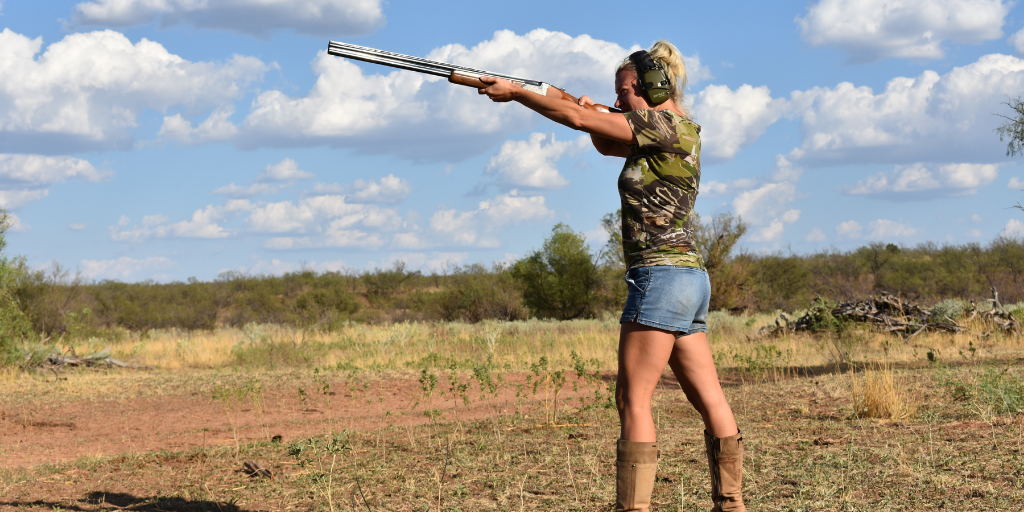
First, let’s talk about the 12 gauge shotgun.
It is the most popular shotgun gauge in the United States, and for good reason. The 12 gauge has a larger bore diameter than the 20 gauge, which means it can shoot larger and more powerful shells. This makes it a great choice for hunting larger game, such as deer or turkey. Additionally, the 12 gauge has a wider variety of ammunition options available, including buckshot and slugs, which can be used for self-defense or hunting purposes. However, the larger size and recoil of the 12 gauge can be intimidating for some shooters, especially those with smaller frames or less experience.
On the other hand, the 20 gauge shotgun is a lighter and more compact option that is popular among youth and female shooters.
It has a smaller bore diameter than the 12 gauge, which means it has less recoil and is easier to handle. This makes it a great choice for beginners or those who are looking for a shotgun that is easier to carry and maneuver. However, the 20 gauge has less stopping power than the 12 gauge and is not as effective for hunting larger game or for self-defense purposes.
Gauge Basics

Understanding Gauge
When it comes to shotguns, the term “gauge” refers to the bore diameter of the gun. The gauge is determined by the number of lead balls that would equal a pound in weight that could fit through the gun’s barrel. For example, a 12-gauge shotgun would have a bore diameter that allows for 12 lead balls of equal weight to fit through the barrel.
It’s important to note that the gauge of a shotgun has no correlation to the length of the barrel or the overall size of the gun. Instead, it is a measurement of the internal diameter of the barrel.
12 Gauge vs 20 Gauge
The two most common gauges for shotguns are 12 gauge and 20 gauge. The 12 gauge is the larger of the two, with a bore diameter of .729 inches. The 20 gauge has a smaller bore diameter of .615 inches.
One of the main differences between the two gauges is the amount of recoil felt when firing.
The 12 gauge typically has more recoil due to its larger size and more powerful load. This can make it more difficult for some shooters to handle, particularly those with smaller frames or less experience.
On the other hand, the 20 gauge is often considered to be more manageable, with less recoil and lighter weight. It is a popular choice for younger or smaller shooters, as well as for hunting smaller game.
When it comes to choosing between a 12 gauge and a 20 gauge shotgun, it ultimately comes down to personal preference and the intended use of the gun. Larger game and longer-range shooting may require the power and range of a 12 gauge, while smaller game and closer-range shooting may be better suited for a 20 gauge.
Usage and Applications
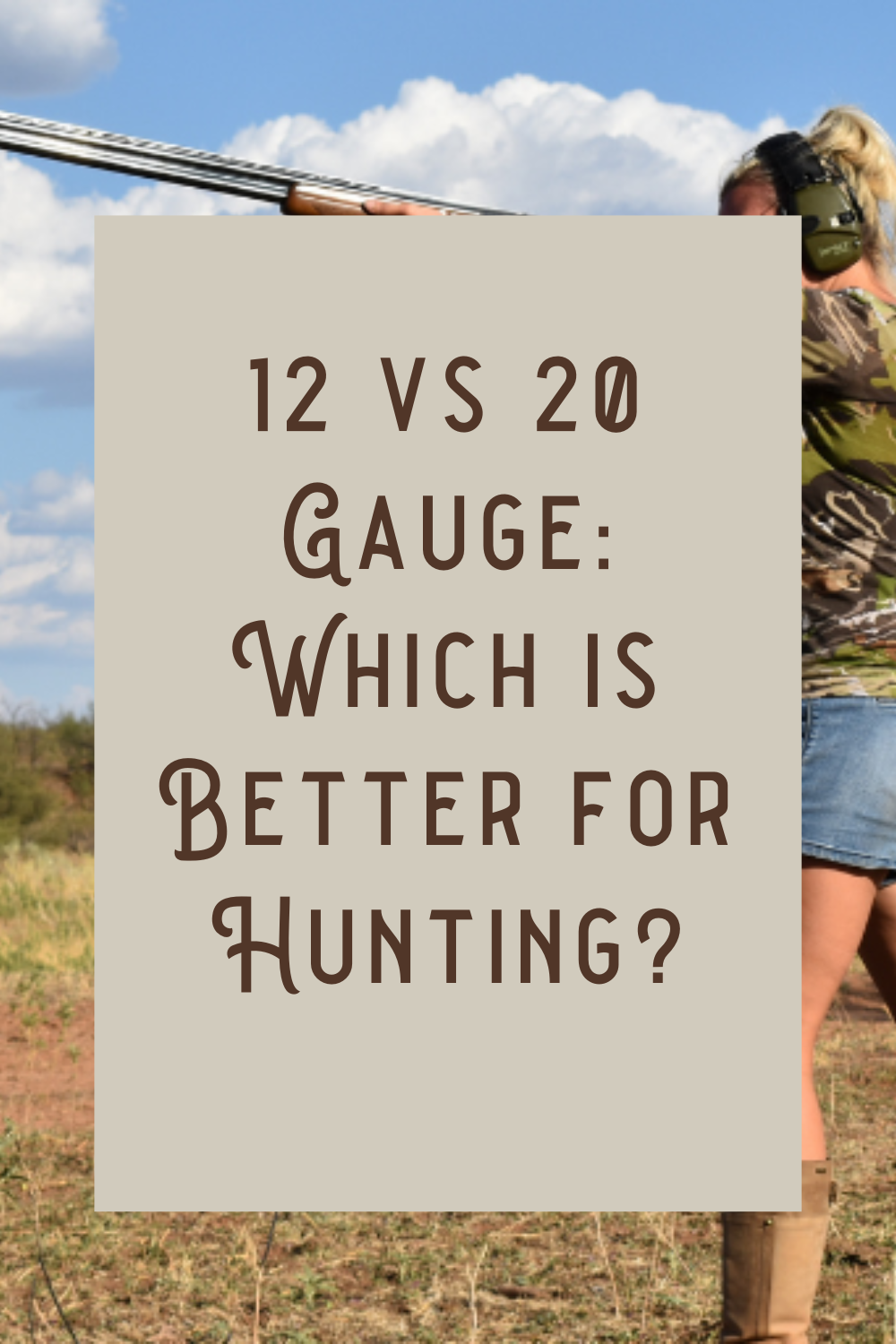
When it comes to choosing between a 12 and 20 gauge shotgun, understanding the various usage and applications of each can help you make the right decision for your needs. Here are a few scenarios where each gauge may be more suitable:
Hunting Scenarios
Both 12 and 20 gauge shotguns are popular choices for hunting, but the ideal gauge may depend on the type of game you’re pursuing. For deer hunting, a 12 gauge shotgun with slugs is often recommended for its power and accuracy. However, if you’re hunting smaller game like upland birds or turkey, a 20 gauge shotgun may be more appropriate due to its lighter recoil and smaller shot size.
Want a free printable checklist to have on hand before your next waterfowl hunt? Download it now.
Home Defense
When it comes to home defense, a shotgun can be an effective tool for protecting your family and property. Both 12 and 20 gauge shotguns can be used for this purpose, but it’s important to consider factors like maneuverability and ease of use. A 20 gauge shotgun may be easier to handle in tight spaces, while a 12 gauge shotgun may offer greater stopping power.
Sporting and Target Shooting
For those interested in sporting and target shooting, both 12 and 20 gauge shotguns can be used for a variety of disciplines. Trap and skeet shooting, for example, often require a 12 gauge shotgun due to its greater range and power. However, a 20 gauge shotgun may be more suitable for sporting clays due to its lighter weight and reduced recoil.
Overall, the choice between a 12 and 20 gauge shotgun will depend on your individual needs and preferences. Whether you’re hunting deer, waterfowl, turkey, or upland birds, or simply looking for a reliable home defense or sporting shotgun, both gauges have their own unique advantages and applications.
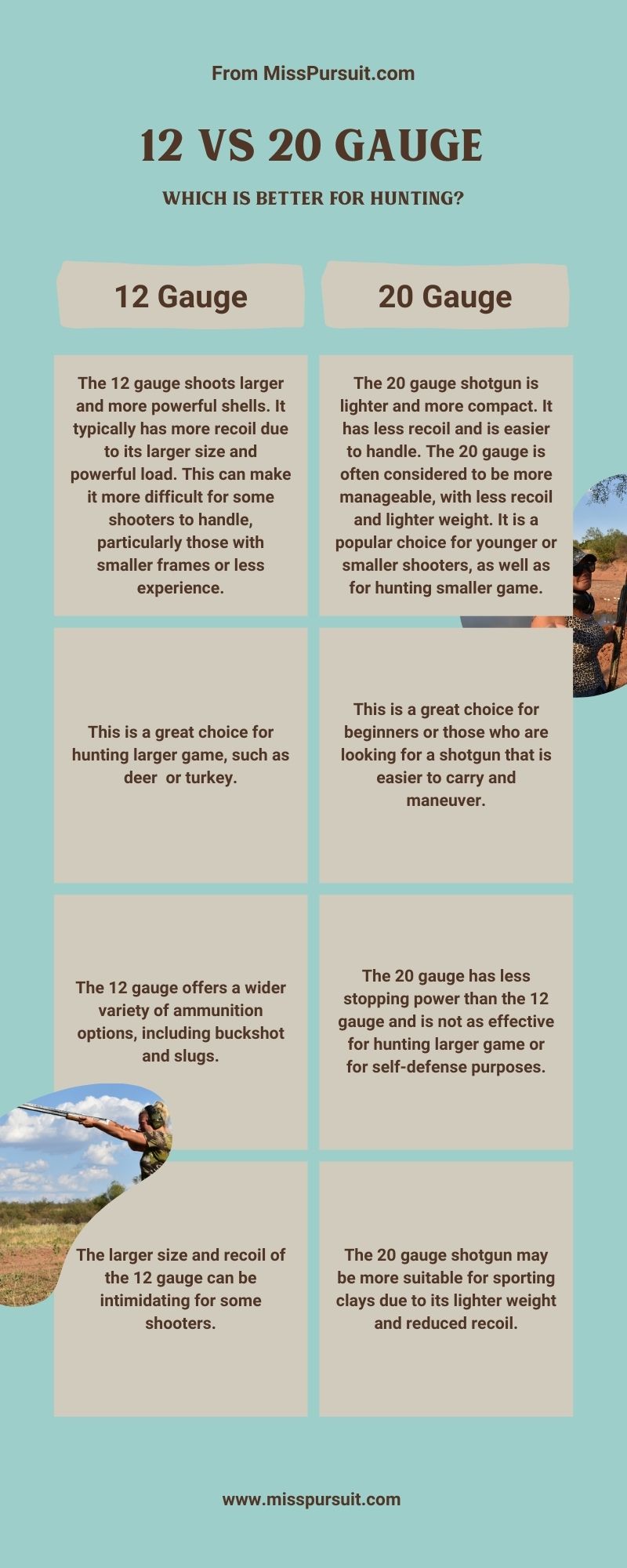
Performance and Handling
When it comes to performance and handling, both the 12 and 20 gauge shotguns have their pros and cons. Let’s take a closer look at the differences between the two gauges.
Recoil and Manageability
One of the most significant differences between the 12 and 20 gauge is the recoil. The 12 gauge typically produces more felt recoil due to its larger powder charge and heavier shot load. This can make it more challenging to handle, especially for smaller or less experienced shooters. On the other hand, the 20 gauge has less felt recoil, making it more manageable and easier to shoot accurately.
Shot Patterns and Accuracy
Another factor to consider when comparing the 12 and 20 gauge is shot patterns and accuracy. The 12 gauge typically produces a wider shot pattern due to its larger shot load and higher velocity. This can be beneficial for hunting birds or other small game, as it increases the chances of hitting the target. However, the wider pattern can also make it more challenging to hit smaller targets or those at longer distances.
The 20 gauge, on the other hand, produces a tighter shot pattern due to its smaller shot load and lower velocity. This can be beneficial for shooting slugs or buckshot, as it increases accuracy and reduces the chances of stray pellets. However, the tighter pattern can also make it more challenging to hit fast-moving targets or those at shorter distances.
Overall, the choice between a 12 or 20 gauge shotgun comes down to personal preference and intended use. While the 12 gauge may be more powerful and versatile, the 20 gauge offers less recoil and tighter shot patterns. Ultimately, it’s up to us to decide which gauge best suits our needs and shooting style.
Ammunition and Cost
When it comes to shotgun ammunition, the 12 gauge and 20 gauge have a wide variety of shotshells available. In this section, we will explore the different types of shotshell varieties and compare the price between the two gauges.
Shotshell Varieties
Shotshells come in different sizes, materials, and shot types. The most common materials used for shotshells are brass and plastic. Birdshot, 00 buckshot, #00 buckshot, sabot slugs, lead balls, and steel shot are some of the shot types available.
The 12 gauge has a wider variety of shotshell sizes and types compared to the 20 gauge. This is because the 12 gauge has a larger caliber and can handle more powder, resulting in a higher velocity and more recoil. The 12 gauge can handle shot sizes ranging from #12 to 00 buckshot and even slugs. On the other hand, the 20 gauge can handle shot sizes ranging from #9 to #4 and slugs.
Price Comparison
When it comes to price, the 20 gauge is generally cheaper than the 12 gauge. This is because the 20 gauge uses less materials and powder compared to the 12 gauge. However, the price difference can vary depending on the shotshell type and brand.
For example, a box of 25 Winchester Super-X 12 gauge 2-3/4″ #8 birdshot can cost around $7.99, while a box of 25 Winchester Super-X 20 gauge 2-3/4″ #8 birdshot can cost around $6.99. Similarly, a box of 5 Winchester Super-X 12 gauge 2-3/4″ 00 buckshot can cost around $6.99, while a box of 5 Winchester Super-X 20 gauge 2-3/4″ #3 buckshot can cost around $7.99.
In conclusion, the 12 gauge has a wider variety of shotshell sizes and types compared to the 20 gauge, but it is generally more expensive. The 20 gauge is cheaper and has a more manageable recoil, making it a good choice for beginners and those who prefer a lighter shotgun.
Frequently Asked Questions
Which has more recoil: a 12 gauge or a 20 gauge shotgun?
When comparing a 12 gauge and a 20 gauge shotgun, the 12 gauge typically has more recoil due to its larger size and more powerful cartridges. However, the amount of recoil can vary depending on the specific shotgun and ammunition used.
Can a 20 gauge shotgun be effectively used for home defense?
Yes, a 20 gauge shotgun can be an effective choice for home defense. It offers less recoil and a lighter weight compared to a 12 gauge, making it easier to handle and shoot accurately in a high-stress situation. However, it’s important to choose the right ammunition and practice proper safety measures.
What’s the difference in power between a 12 gauge and a 20 gauge?
A 12 gauge shotgun typically has more power than a 20 gauge due to its larger size and more powerful cartridges. This means that a 12 gauge can shoot larger and heavier shot with more force, resulting in a wider spread and greater impact. However, a 20 gauge can still be effective for many types of shooting.
What are the advantages of using a 20 gauge for sporting clays?
Using a 20 gauge for sporting clays can offer several advantages. It offers less recoil and a lighter weight compared to a 12 gauge, making it easier to handle and shoot accurately over long periods of time. Additionally, a 20 gauge can be more forgiving when it comes to shot placement, allowing for a more enjoyable shooting experience.
How does the shot spread compare between a 12 gauge and a 20 gauge?
The shot spread between a 12 gauge and a 20 gauge can vary depending on the specific shotgun and ammunition used. Generally, a 12 gauge shotgun will have a wider shot spread due to its larger size and more powerful cartridges. However, a 20 gauge can still offer a wide enough spread for many types of shooting.
What are some common uses for 20 gauge shotguns?
20 gauge shotguns are commonly used for hunting small game such as rabbits and squirrels, as well as for shooting sporting clays and skeet. They can also be used for home defense and as a lighter weight alternative to a 12 gauge for many types of shooting.

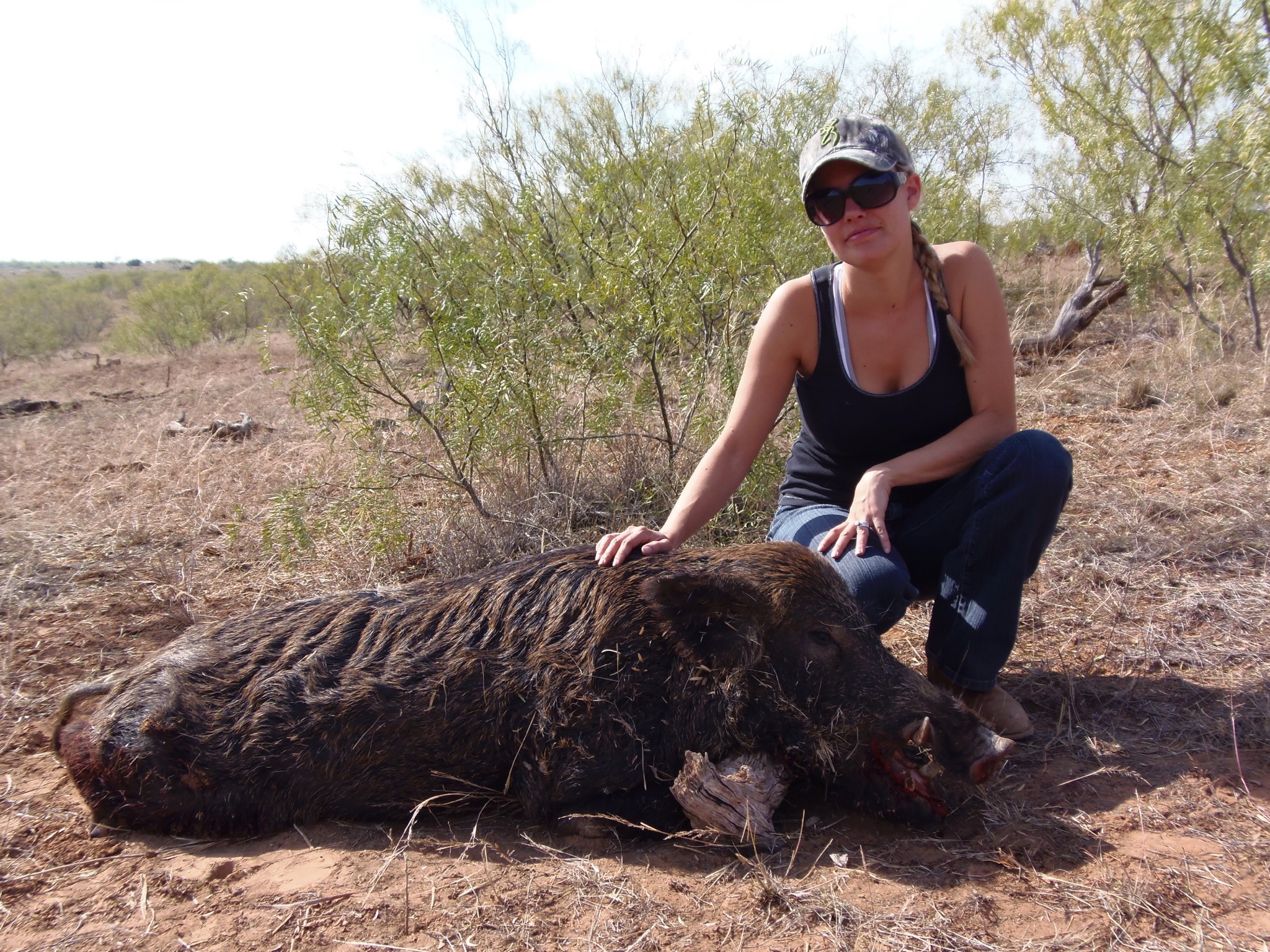
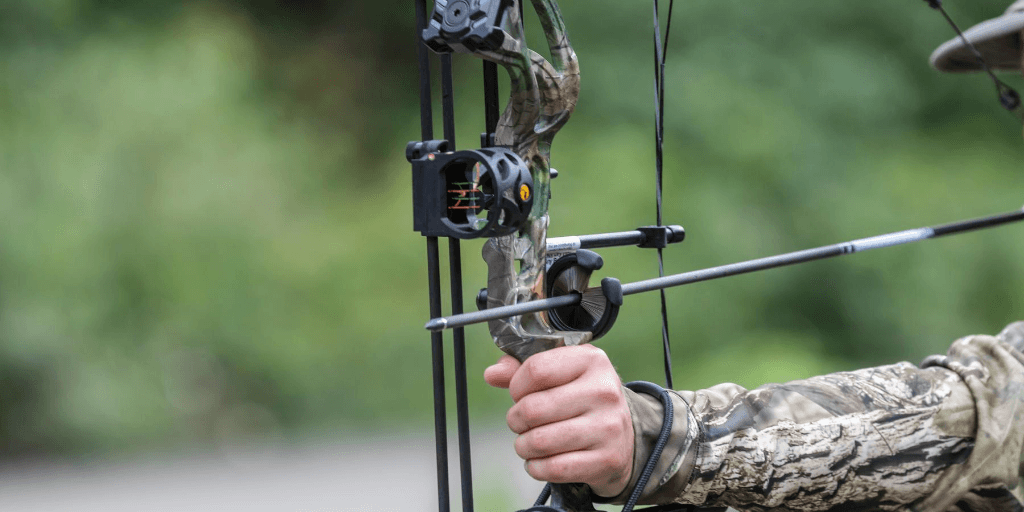


One thought on “12 vs 20 Gauge: Which is Better for Hunting?”